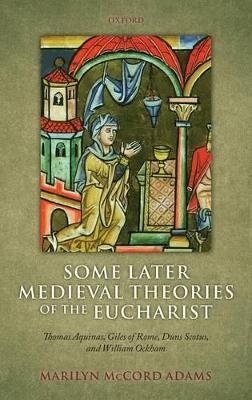
Some Later Medieval Theories of the Eucharist
Oxford University Press (Verlag)
978-0-19-959105-3 (ISBN)
How can the Body and Blood of Christ, without ever leaving heaven, come to be really present on eucharistic altars where the bread and wine still seem to be? Thirteenth and fourteenth century Christian Aristotelians thought the answer had to be "transubstantiation."
Acclaimed philosopher, Marilyn McCord Adams, investigates these later medieval theories of the Eucharist, concentrating on the writings of Thomas Aquinas, Giles of Rome, Duns Scotus, and William Ockham, with some reference to Peter Lombard, Hugh of St. Victor, and Bonaventure. She examines how their efforts to formulate and integrate this theological datum provoked them to make significant revisions in Aristotelian philosophical theories regarding the metaphysical structure and location of bodies, differences between substance and accidents, causality and causal powers, and fundamental types of change. Setting these developments in the theological context that gave rise to the question draws attention to their understandings of the sacraments and their purpose, as well as to their understandings of the nature and destiny of human beings.
Adams concludes that their philosophical modifications were mostly not ad hoc, but systematic revisions that made room for transubstantiation while allowing Aristotle still to describe what normally and naturally happens. By contrast, their picture of the world as it will be (after the last judgment) seems less well integrated with their sacramental theology and their understandings of human nature.
Marilyn McCord Adams taught medieval philosophy and philosophy of religion at UCLA for twenty-one years. During this period, she was also ordained an Episcopal priest in the Diocese of Los Angeles. She then moved to Yale to become Horace Tracy Pitkin Professor of Historical Theology and subsequently to Oxford to take up her post as Regius Professor of Divinity and Canon at Christ Church. She is now Distinguished Research Professor of Philosophy at University of North Carolina-Chapel Hill. She has published widely on medieval thinkers and on philosophical theology. Her books include William Ockham (2 vols), Horrendous Evils and the Goodness of God, and Christ and Horrors: The Coherence of Christology.
PROLOGUE ; Introduction ; 1. Aristotelian Preliminaries ; I: WHY SACRAMENTS? ; 2. What, Why, and Wherefore ; 3. Sacramental Causality: 'Effecting What They Figure!' ; II: THE METAPHYSICS AND PHYSICS OF REAL PRESENCE ; 4. Explaining the Presence, Identifying the Change: Aquinas and Giles of Rome ; 5. Duns Scotus on Placement Problems ; 6. Duns Scotus on Two Types of Transsubstantiation ; 7. Remodelling with Ockham ; 8. Accidents without Substance: Aquinas and Gilles of Rome ; 9. Independent Accidents: Scotus and Ockham ; 10. Theology Provoking Philosophy ; III: WHAT SORT OF UNION? ; 11. Eucharistic Eating and Drinking ; 12. Sacraments, Why Ceasing? ; POST-SCRIPT ; List of Numbered Propositions ; Bibliography
| Erscheint lt. Verlag | 21.10.2010 |
|---|---|
| Verlagsort | Oxford |
| Sprache | englisch |
| Maße | 163 x 241 mm |
| Gewicht | 660 g |
| Themenwelt | Geschichte ► Allgemeine Geschichte ► Mittelalter |
| Geisteswissenschaften ► Philosophie ► Philosophie des Mittelalters | |
| Religion / Theologie ► Christentum ► Kirchengeschichte | |
| Religion / Theologie ► Christentum ► Liturgik / Homiletik | |
| ISBN-10 | 0-19-959105-9 / 0199591059 |
| ISBN-13 | 978-0-19-959105-3 / 9780199591053 |
| Zustand | Neuware |
| Haben Sie eine Frage zum Produkt? |
aus dem Bereich


